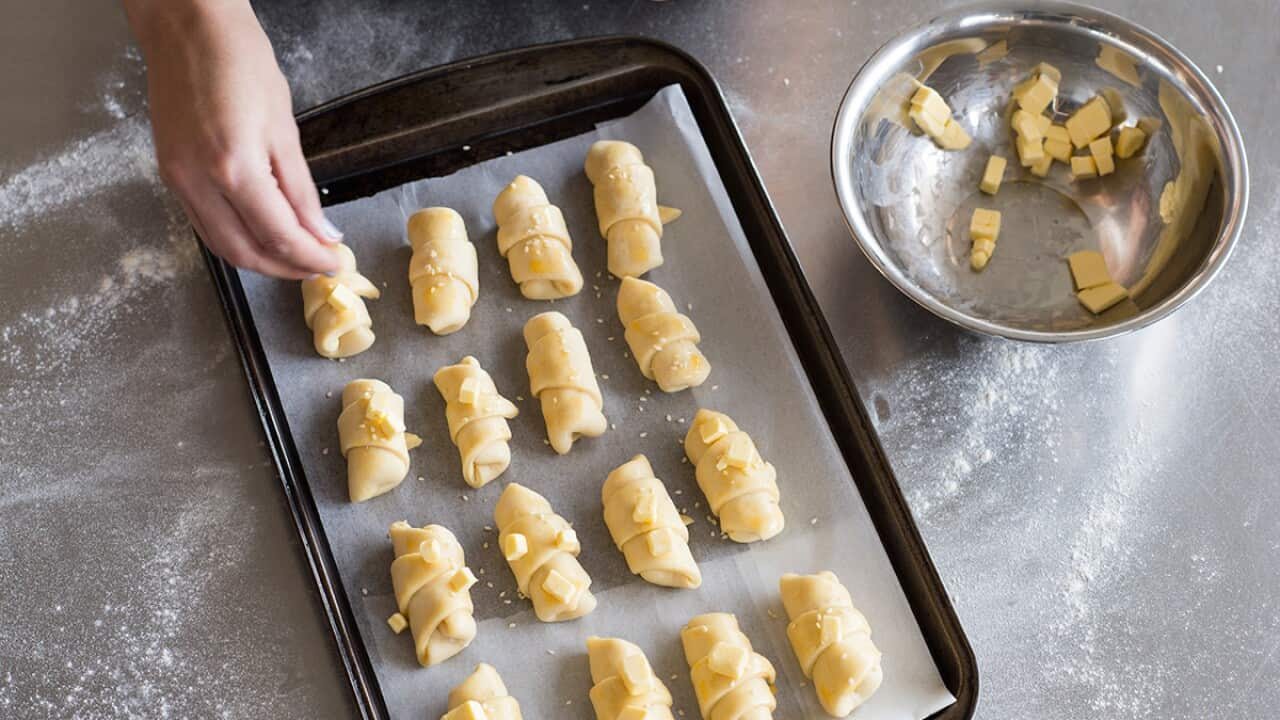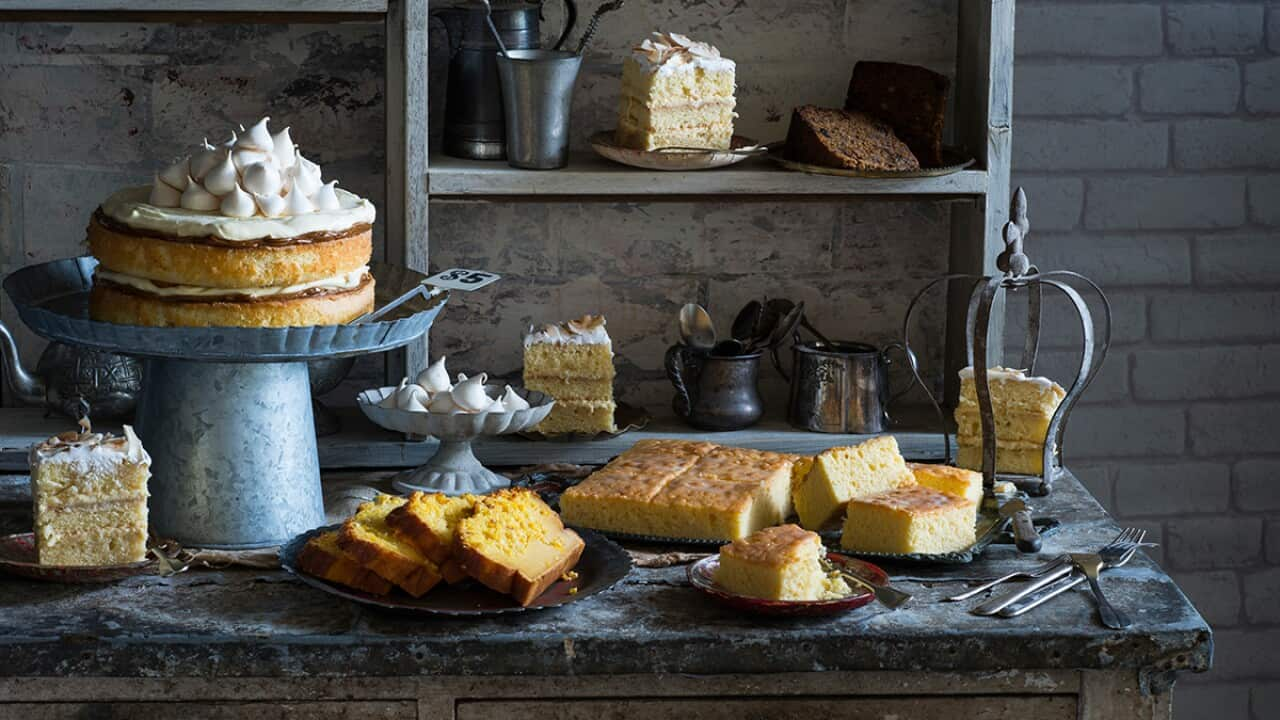Flatbread was the original bread, and I mean the real original – the first bread ever. Not a bad claim to fame, eh?
In fact, the idea of flatbread was a positively ancient way of turning hard grain into something people could eat. So the process of pounding grain into flour, mixing it with water and cooking it spread thinly over a hot stone was literally life-changing for humankind. The use of yeast to leaven bread, which started happening about 5000 years ago, was another major game-changer.
Evolution has reshaped the flatbread as it developed over time and migrated worldwide, but the way it is cooked (quickly over hot stones, and later in history on the hearth of stone ovens) and the thin ‘flat’ result remains the way it is defined.
A preheated pizza stone is handy in most cases to ensure the heat is quickly transferred to the bread for the quick baking that gives an authentic result.
Flatbread also started out, and remains, a clever multitasker. It was and is used to dip into, scoop up or sop up, wrap, cover and carry other food, and works well as a blank edible canvas to top as you wish.
Soft, chewy, flaky. Puffy, dense, crisp. Leavened or unleavened. Like a lesson in geography and history, you’ll find an extraordinary array of flatbreads the world over, from all corners and cultures. India has its chapatis and naan, Ethiopia its , France its crepe, Mexico its tortilla, Armenia its lavash, France its and , Malaysia its , Turkey its , Sweden its tunnbrod, and so the list goes on.
History aside, flatbreads now fall into two main categories – leavened (based on a yeast dough) and unleavened (without yeast), and this month I’m sharing with you the leavened kind.
The Italian focaccia is one of the thickest of the flatbreads and eventually inspired the creation of pizza (a miracle!). It involves topping restraint, with the bread itself the perfect vehicle for flavouring with herbs and olives, such as in my tasty . Heading slightly east to Turkey you’ll find the . This moreish flatbread has a long fermentation time that gives its distinctive well-developed and slightly sour flavour. It’s perfect for dipping into and sopping up fragrant Middle Eastern stews and dips.
Heading slightly east to Turkey you’ll find the . This moreish flatbread has a long fermentation time that gives its distinctive well-developed and slightly sour flavour. It’s perfect for dipping into and sopping up fragrant Middle Eastern stews and dips. And then there is naan. The Indian version is one of the world’s favourite flatbreads but , is a slightly flakier type thanks to its ghee-infused dough. It is often brushed with saffron water before baking, not only adding flavour but also an exotic sunset hue to its crust.
And then there is naan. The Indian version is one of the world’s favourite flatbreads but , is a slightly flakier type thanks to its ghee-infused dough. It is often brushed with saffron water before baking, not only adding flavour but also an exotic sunset hue to its crust. A little less showy is the earthy . Similar to pita, this rye-based leavened flatbread makes the perfect pocket bread to split and fill with all manner of ingredients – try gravlax (or prawns) with crème fraîche and delicate salad leaves or dill for a truly Swedish experience!
A little less showy is the earthy . Similar to pita, this rye-based leavened flatbread makes the perfect pocket bread to split and fill with all manner of ingredients – try gravlax (or prawns) with crème fraîche and delicate salad leaves or dill for a truly Swedish experience! And then there is the . This large flatbread is easily recognised by its traditional oval shape and bold central lines. A flour wash gives it a deliciously crisp upper crust that contrasts particularly well with its soft, slightly chewy texture.
And then there is the . This large flatbread is easily recognised by its traditional oval shape and bold central lines. A flour wash gives it a deliciously crisp upper crust that contrasts particularly well with its soft, slightly chewy texture. A well preheated, extremely hot oven is generally the key to a good flatbread. And as most of us don’t have access to a traditional stone or clay oven to hearth-bake these flatbreads, a preheated pizza stone is handy in most cases to ensure the heat is quickly transferred to the bread for the quick baking that gives an authentic result.
A well preheated, extremely hot oven is generally the key to a good flatbread. And as most of us don’t have access to a traditional stone or clay oven to hearth-bake these flatbreads, a preheated pizza stone is handy in most cases to ensure the heat is quickly transferred to the bread for the quick baking that gives an authentic result.

Olive and rosemary focaccia Source: Alan Benson

Turkish flatbread (bazlama) Source: Alan Benson

Taftan (flatbread) Source: Alan Benson

Soft polar bread (polarbröd) Source: Alan Benson

Armenian flatbread (matnakash) Source: Alan Benson
Whatever kind of flatbread you make and however you bake it and use it, take a moment to enjoy the wonderful simplicity and history in every bite.
Photography by Alan Benson. Styling by Sarah O'Brien. Food preparation by Tina McLeish.
Anneka's mission is to connect home cooks with the magic of baking, and through this, with those they love. For hands-on baking classes and baking tips, visit her at . Don't miss what's coming out of her oven via ,, and .
View previous Bakeproof columns and recipes

Bakeproof: Little cakes








